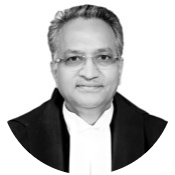A.M. Khanwilkar

A.M. Khanwilkar
Former Judge of the Supreme Court of India
Assumed Office13th May, 2016
Retired On29th Jul, 2022
Previously
Chief Justice of the Madhya Pradesh High CourtNovember 24th 2013 - May 13th 2016
Chief Justice of the Himachal Pradesh High CourtApril 4th 2013 - November 23rd 2013
Permanent Judge of the Bombay High CourtApril 8th 2002 - April 3rd 2013
Additional Judge of the Bombay High CourtMay 29th 2000 - April 7th 2002
EnrolmentFebruary 10th 1982
Profile
Early Life and Education
Justice Ajay Manikrao Khanwilkar was born in Pune on July 30th, 1957. After completing his Bachelor of Commerce from Mulund College, Mumbai he attended K.C. Law College, Mumbai. Subsequently, he enrolled as an advocate on February 10th, 1982.
Career as an Advocate
As an Advocate, Khanwilkar J specialised in Civil, Criminal and Constitutional matters. From July 1984 onwards, he exclusively practised in the Supreme Court. He represented the State of Maharashtra at the SC, first as Standing Counsel for State in 1985 and continued later as an Additional Government Advocate till December 1989. In 1995 he was appointed as the Standing Counsel for the Election Commission of India at the SC. He was elevated as a Judge in the Bombay High Court on March 29th, 2000. As a part of his private practice, he would often represent statutory authorities or individuals who held public offices.
Justice Khanwilkar has assisted the SC on multiple occasions. In 1994 he was appointed as Amicus Curiae (friend of the Court) to assist the SC on environmental issues in the M.C. Mehta case regarding effluents from tanneries being released into the Ganga river. In 1995, he was appointed as a member of the task force formed to examine the Prevention of Food Adulteration Act, 1954.
Career as a Judge
After Khanwilkar J’s elevation to the Bombay HC in 2000, he was confirmed as a Permanent Judge On April 8th 2002. He was later briefly elevated as the Chief Justice of the Himachal Pradesh HC before becoming the Chief Justice of the Madhya Pradesh HC as well in November 2013, where he would serve till his appointment as an SC Judge on May 13th 2016. He will retire on July 29th, 2022, after serving a 6-year term.
Tenure at the Supreme Court in Numbers
Figure 1 shows that during his tenure so far, Khanwilkar J has written 226 Judgments and has been a part of 817 Benches.
In the Judgments he has authored, Khanwilkar J has not focused on any single kind of subject matter. Criminal (14%), Civil (13%) and Constitutional (8%) matters form the largest portion of the Judgments he has authored, as seen in Figure 2.
Post-Retirement
On November 14th, 2022 the Union government announced the winners of the National Sports Awards, 2022, based on recommendations of a Selection Committee led by Justice Khanwilkar.
Notable Judgments
In Common Cause v Union of India (2018), a 5-Judge Bench held that the right to die with dignity is a fundamental right under Article 21 of the Indian Constitution. This right allows the patient to refuse medical treatment causing pain and suffering in case of a terminal illness and hasten the process of dying. Justice Khanwilkar was a part of the majority which held that the right to die is a part of the right to bodily autonomy, integrity, and freedom of choice.
Justice Khanwilkar was part of the Constitution Bench in Public Interest Foundation v Union of India (2019), which held that the Judiciary did not have the power to disqualify members of legislatures when charges were framed against them. Only the Legislature may exercise this power. It was further held that the candidates should not be disqualified solely because they were convicted in a criminal case.
In Municipal Corporation of Greater Mumbai v Ankita Sinha (2021), the 3-Judge Bench of the Supreme Court, including Justice Khanwilkar, held that the National Green Tribunal (NGT) possesses suo moto powers and can initiate hearings on the basis of letters and newspaper reports without a petition being filed. The Bench further held that the NGT is not only an adjudicatory body but can engage in wider functions of prevention, remedy, and amelioration. The ruling was given after the NGT had taken suo moto cognisance of an article published in an online news portal that spoke about the adverse impact that the mismanagement of solid waste had on public health and the environment in Mumbai city.
In Vikas Kishan Rao Gawali v State of Maharashtra (2021), the 3-Judge Bench of the Supreme Court laid down a test that the State Governments must apply before reserving seats for OBCs in local bodies. Justice Khanwilkar authored the Judgment. The ruling stems from various petitions that were filed in the Bombay High Court challenging reservations exceeding 50% in respect of Zilla Parishads and Panchayat Samitis in Maharashtra. According to the test, the State government would have to set up a committee that would conduct inquiry into the nature of the backwardness of local bodies within the State; the government would then have to specify the proportion of reservation required to be provisioned local body-wise and make sure that the reservations for SC/STs and OBCs does not exceed 50% of the total number of seats.
In Noel Harper v Union of India (2022) a 3-Judge Bench upheld the constitutionality of the Foreign Contribution (Regulation) Amendment Act, 2020. The Union Government through this Amendment further restricted NGO’s access to foreign funds, in the interest of national security. NGOs challenged this Amendment arguing that it was arbitrary, violated their right to foreign funds and had a disproportionate impact on them. In a Judgment authored by Justice Khanwilkar, the Court upheld the Amendment, stating that it would allow the Union to monitor transactions more carefully and maintain the sovereignty of the nation.







